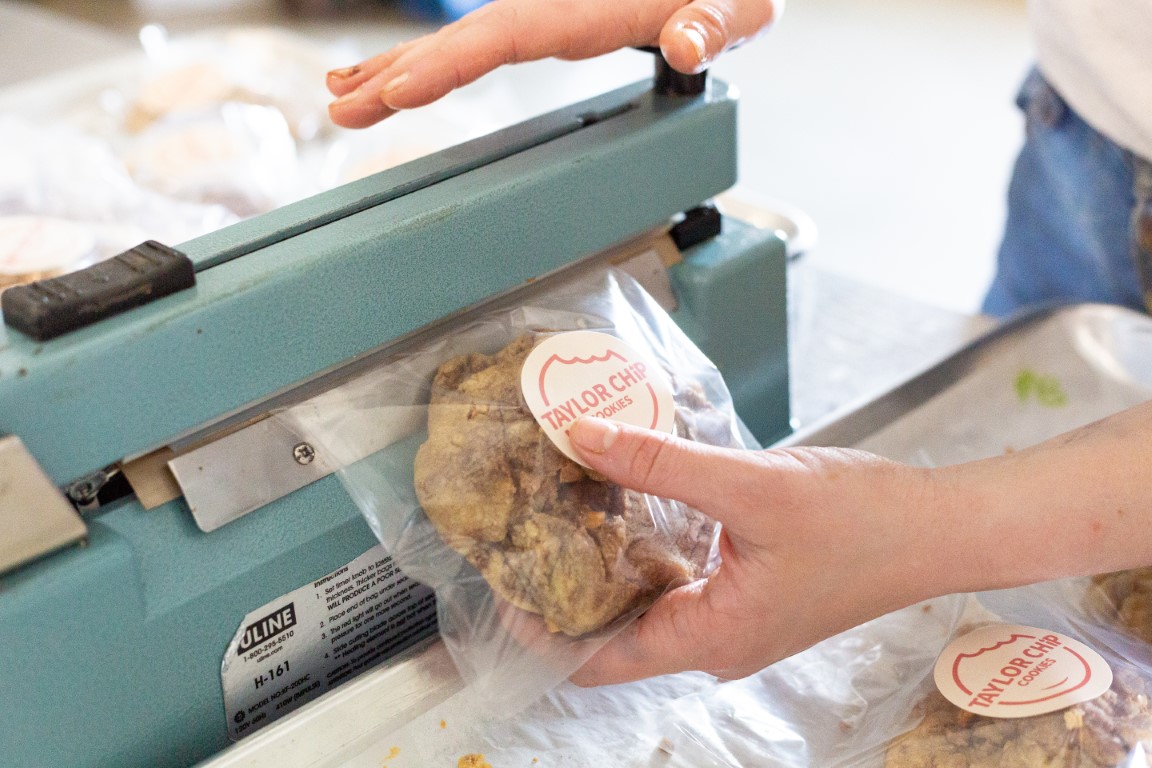To store meringue cookies and maintain their airy, crisp texture, you'll need to use an airtight container to shield them from moisture. Confirm the cookies are completely cooled before transferring them, as lingering warmth can create condensation. Layer the cookies with parchment paper to prevent sticking and place them in a cool, dry area away from direct sunlight to avoid temperature fluctuations. If you live in a humid climate, consider adding silica gel packets to the container to absorb excess moisture. For more tips on perfect storage techniques and troubleshooting common issues, there's additional advice available.
Key Takeaways
- Use Airtight Containers: Store meringue cookies in airtight containers to prevent moisture absorption and maintain crispness.
- Cool Completely: Ensure cookies are fully cooled before storing to avoid condensation and sogginess.
- Layer with Parchment Paper: Separate cookies with parchment paper to prevent sticking and crumbling.
- Store in a Cool, Dry Place: Keep cookies in a cool, dry environment away from direct sunlight and humidity.
- Revive Stale Cookies: Use a low-temperature oven or microwave to restore crispness to stale meringue cookies.
Understanding Meringue Cookies
Meringue cookies come in several varieties, including French, Swiss, and Italian, each offering unique textures and flavors. Commonly used as light, airy treats or elegant decorations for desserts, meringue cookies can also serve as a base for more complex confectioneries. Understanding these types and their uses is essential for proper storage and maximizing their shelf life.
Types and Common Uses
When it comes to understanding meringue cookies, you'll find they come in three main types: French, Swiss, and Italian. French meringue is the simplest, made by whipping egg whites and sugar until stiff peaks form. It's often used for cookies because of its light and airy texture. Swiss meringue is made by gently heating egg whites and sugar over a double boiler before whipping. This creates a denser, more stable meringue, perfect for piping elaborate designs. Italian meringue, the most stable, involves boiling sugar syrup poured into whipped egg whites, ideal for frostings and mousses.
To store your meringue cookies, especially French meringue, place them in an airtight container to maintain their crispness and prolong their shelf life. Store them at room temperature, away from excess moisture, which can make them sticky. If you plan to freeze them, first place them on a parchment-lined baking sheet until firm, then transfer them to a freezer-safe container. This way, they won't clump together. Understanding these types and uses helps you appreciate their versatility and guarantees you store them properly for maximum enjoyment.

Choose Your Own Delightfully Perfect Cookies.
With almost 30 flavors to choose from, you can make your box as unique as you are.
Factors Affecting Meringue Cookie Storage
When storing meringue cookies, you need to take into account factors like humidity and temperature, as well as air exposure. High humidity can make the cookies sticky and chewy, while fluctuating temperatures can affect their crispness. Additionally, exposing them to air can lead to moisture absorption, so proper sealing is essential.
Humidity and Temperature
Maintaining the delicate texture of meringue cookies hinges on understanding the impact of humidity and temperature. These two factors can make or break the storage process, guaranteeing your meringue cookies remain crispy and delightful. Here's what you need to know:
- Store meringue cookies in an air-tight container to keep out moisture.
- Excessive humidity can cause meringue cookies to absorb water, making them chewy.
- Keeping cookies in a closed oven after baking can help them dry out completely.
- Ideal storage temperature is cool and dry to prevent beads of moisture from forming.
- Avoid storing cookies in warm areas where temperature fluctuations are common.
When storing meringue cookies, always use an air-tight container to create a barrier against humidity. High humidity levels can cause beads of moisture to form on your cookies, leading to a chewy texture instead of a crisp one. After baking, let them cool in a closed oven. This step guarantees they dry thoroughly, reducing the risk of moisture. It's crucial to store them at a stable, cool temperature, as fluctuations can also lead to moisture accumulation. By following these guidelines, you can maintain the perfect texture of your meringue cookies.
Air Exposure
Air exposure plays an important role in preserving the texture and quality of meringue cookies. When these delicate treats are exposed to air, they can quickly lose their crispness and become chewy. To maintain their signature crunch, you should always store them in an airtight container. This prevents moisture from the air, which can drastically affect the cookies' texture, from seeping in.
Before placing the meringue cookies in the container, it's advisable to line the container with parchment paper. This layer adds an extra shield against humidity and helps keep the cookies dry. Furthermore, it's crucial to store the container in a cool, dry place, away from direct sunlight. Sunlight can increase the temperature inside the container, causing condensation and potentially ruining the cookies.
Additionally, consider the environment where you're storing the meringue cookies. High humidity levels can still affect the cookies even inside an airtight container, so it's best to store them in a climate-controlled area. By taking these precautions, you can guarantee your meringue cookies remain as crisp and delightful as the day they were baked. Proper storage not only preserves their texture but also extends their shelf life.
Best Practices for Storing Meringue Cookies

To guarantee your meringue cookies stay fresh and crisp, store them at room temperature in airtight containers, which will protect them from moisture and humidity. If you need to store them for an extended period, consider freezing the cookies, but guarantee they are completely cool and dry before doing so. Proper storage will maintain their texture and flavor, allowing you to enjoy them for longer.
Room Temperature Storage
One effective way to keep your meringue cookies fresh at room temperature is by storing them in an airtight container. This method helps maintain the light, crisp texture of your baked meringue while preventing them from becoming chewy meringues due to moisture exposure. To guarantee the best results, follow these guidelines:
- Use an airtight container: This prevents air and moisture from seeping in, which can make your cookies soft.
- Layer with parchment paper: Place a sheet of parchment paper between each layer of meringue cookies to avoid sticking and crumbling.
- Keep them away from humidity: Store the container in a cool, dry place to avoid exposure to moisture, which can cause the cookies to lose their crispness.
- Avoid direct sunlight: Sunlight can heat the container, causing condensation and, subsequently, chewy meringues.
- Check periodically: Occasionally check the cookies to guarantee they remain crisp and dry.
Using Airtight Containers
Properly using airtight containers is essential for maintaining the delightful texture of your meringue cookies. To begin, confirm your cookies are fully cooled after baking on a parchment paper-lined baking sheet in a preheated oven. Any residual heat can create moisture, leading to soggy cookies. Once cooled, use a prepared baking sheet to transfer the cookies to a clean bowl.
Next, select an airtight freezer-safe container to store your meringue cookies. These containers are designed to keep air and moisture out, preserving the crispness of your cookies. Before placing the cookies inside, verify the container is completely dry and clean. Moisture and residual food particles can compromise the texture and flavor.
When layering the cookies, use parchment paper between each layer to prevent them from sticking together. This also helps maintain their delicate shape and structure. Seal the container tightly and store it in a cool, dry place away from direct sunlight.
Freezing Guidelines
Freezing meringue cookies can be a transformative factor for extending their shelf life while preserving their crispness and flavor. To get started, make certain the cookies are completely cool. Follow these freezing guidelines to guarantee your meringue cookies stay fresh and delicious:
- Lay Out on Parchment Paper: Place the cooled meringue cookies on a baking sheet lined with parchment paper, ensuring they don't touch each other.
- Initial Freeze: Put the baking sheet in the freezer for about an hour. This initial freeze will make the cookies firm and prevent them from sticking together later.
- Transfer to Airtight Container: Once frozen, transfer the cookies to an airtight container to protect them from moisture and freezer burn.
- Label and Date: Clearly label the container with the type of cookies and the date you froze them. This helps you keep track of their storage time.
- Optimal Storage Time: Meringue cookies can be stored in the freezer for up to three months, maintaining their texture and taste.
Maintaining Crispness and Troubleshooting
To keep your meringue cookies crisp, you need to avoid common mistakes like storing them in humid environments, which can quickly ruin their texture. If your meringues become stale, you can revive them by briefly placing them in a low-temperature oven. Additionally, identifying and solving storage issues, such as using airtight containers, will help maintain their delightful crunch.
Avoiding Common Mistakes
Maintaining the crispness of your meringue cookies can feel like a delicate balancing act. To guarantee they remain light and crunchy, you need to avoid some common pitfalls. First, meringue cookies are sensitive to moisture and can absorb air over time, losing their crisp texture. Here's how to keep them perfect:
- Store in an airtight container: This prevents them from absorbing moisture from the air.
- Avoid high humidity: Keep them in a cool, dry place, especially during humid weather.
- Cool completely before storing: Any residual warmth can create condensation inside the container.
- Use a desiccant: Adding a silica gel packet can help absorb any excess moisture.
- Check for stable meringue: Confirm your meringue is properly whipped and baked for stability.
When making meringue cookies, achieving a stable meringue is essential. Beat the egg whites until stiff peaks form, making sure no egg yolk or grease contaminates them. Even the slightest amount of fat can prevent the meringue from whipping up fully. Additionally, always use clean, dry utensils and bowls to avoid introducing moisture. By following these steps, you'll maintain the delightful crispness of your meringue cookies and prevent common issues.
Reviving Stale Meringues
If your meringue cookies have gone stale, don't worry—there are effective ways to bring back their delightful crunch. The key to reviving meringues lies in removing excess moisture and restoring their crisp texture. Begin by preheating your oven to a low temperature, around 200°F (93°C). Place the stale meringues on a baking sheet, making sure they're spread out evenly.
Next, put the baking sheet in the preheated oven and leave the oven door slightly propped open. This allows moisture to escape, helping the meringues dry out without overcooking. Check the cookies every 15 minutes to confirm they don't brown or burn. Depending on the humidity and thickness of the meringues, the process may take anywhere from 30 minutes to an hour.
If you prefer using a microwave, place the meringues in a heat-proof bowl and microwave them on low setting for short intervals, about 10-15 seconds each time. Be cautious and check frequently to prevent melting or overheating.
Once you've achieved the desired crisp texture, let the meringues cool completely before storing them again in an airtight container. This method guarantees your revived meringues stay fresh and crunchy.
Identifying and Solving Storage Issues
A crisp meringue cookie is a delightful treat, but improper storage can quickly turn it chewy and disappointing. To maintain their crispness, you need to address common storage issues, such as exposure to humidity and improper sealing. Here's how to keep your meringue cookies in perfect condition:
- Use an airtight container: Store meringue cookies in an airtight container to prevent moisture from seeping in.
- Avoid humid environments: Humidity can make meringue cookies soggy. Keep them in a cool, dry place.
- Separate layers with parchment paper: If stacking cookies, use parchment paper to prevent them from sticking together.
- Check the shelf life: Homemade meringue cookies typically have a shelf life of about two weeks when stored properly.
- Revive soggy cookies: If they've turned soft, you can try reviving them by placing them in a low-temperature oven for a few minutes.
Why Trust Our Sweet Insights: From Baking Enthusiasts to Cookie Experts
At Taylor Chip, our journey from passionate home bakers to cookie connoisseurs uniquely positions us to share valuable insights on all things sweet, including the art of crafting and storing delicate treats like meringue cookies. Our founders, Sara and Dougie Taylor, began their culinary adventure in 2015, driven by a shared love for sweets and each other. What started as a fun date night activity quickly evolved into a dedicated pursuit of baking perfection.
Over the course of a year, Sara and Dougie honed their skills through countless hours of experimentation, learning the intricacies of various baking techniques and ingredients. This hands-on experience, coupled with their unwavering commitment to quality, led them to master the art of cookie-making just in time for their wedding. Their journey mirrors the precision and care required in creating perfect meringue cookies – a process that demands attention to detail, patience, and a deep understanding of baking science.
While our specialty at Taylor Chip may be cookies, our expertise extends to all aspects of baking, including the delicate nature of meringues. We understand the crucial factors that affect texture, flavor, and storage of these airy treats. Our experience in perfecting recipes and techniques allows us to offer practical, tested advice on maintaining the quality of your baked goods. When we share tips on storing meringue cookies, you can trust that our guidance comes from a place of genuine passion and hard-earned knowledge in the world of sweet treats.
Frequently Asked Questions
Can Meringue Cookies Be Stored in the Refrigerator?
No, you shouldn't store meringue cookies in the refrigerator. The moisture in the fridge will make them soft and sticky. Instead, keep them in an airtight container at room temperature to maintain their crisp texture.
Is It Safe to Freeze Meringue Cookies for Long-Term Storage?
Yes, it's safe to freeze meringue cookies for long-term storage. Place them in an airtight container or freezer bag. When you're ready to eat, let them thaw at room temperature to maintain their texture.
Do Flavored Meringue Cookies Require Special Storage Methods?
You don't need any special storage methods for flavored meringue cookies. Just store them in an airtight container at room temperature. Keep them away from moisture and heat to guarantee they stay crispy and delicious.
How Can Humidity Impact Meringue Cookie Storage?
Humidity can make your meringue cookies sticky and chewy instead of crisp. Always store them in an airtight container, preferably in a cool, dry place to maintain their texture and prevent them from absorbing moisture.
Are There Specific Containers Recommended for Storing Meringue Cookies?
Yes, you should use airtight containers to store meringue cookies. This helps keep out moisture, preserving their crispness. Avoid plastic bags as they might not seal properly and can let in humidity, ruining the texture.
Conclusion
By understanding the factors that affect meringue cookies and following best storage practices, you'll keep your meringues crisp and delicious. Store them in an airtight container at room temperature, away from humidity and direct sunlight. If they lose their crispness, a quick bake in a low oven can help. With these tips, your meringue cookies will remain delightful treats for days. Remember, proper storage is key to maintaining their texture and flavor.









